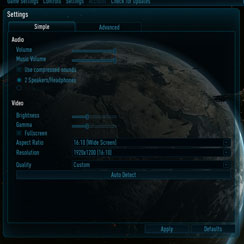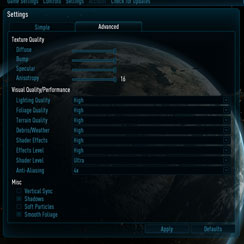First Look: Nvidia 3-way SLI on nForce 680i
December 13, 2007 | 14:01

Enemy Territory: Quake Wars
Publisher: ActivisionBuilt on an updated version of id Software's Doom 3 engine, Enemy Territory: Quake Wars is a team-based first person shooter that recently obtained the title of being the first game to use John Carmack's megatexture technology: a single texture that spans the entire map.
ET:QW also makes use of many vehicles and large open areas which means the action in view can get really intensive in this team based shooter. It's also the only game in this suite that utilises OpenGL instead of the pretty much industry-standard DirectX API. We used the full retail version of the game patched to version 1.1.
We recorded a timenetdemo that lasts for several minutes during an online game - this used lots of the different graphical effects to create what we've deemed to be a fairly typical slice of action to stress the system. We also created a custom autoexec file that enabled ultra high video settings, over and above that of the standard in game "high".
However, because of some display corruption on the Radeon HD 2900 XT, Radeon HD 2900 XT CrossFire and Radeon HD 2900 Pro configurations, we had to disable soft particles on all cards to give a fair apples-to-apples comparison. It’s worth bearing in mind that you’ll be able to turn this effect on with GeForce 8-series hardware.
Frame rate is incredibly important in a game like Quake Wars as it’s a competitive game. The reason I say this is because when you’re playing games competitively, you don’t want your frame rate to ever drop below 60 frames per second (or even 100 frames per second) if you can help it, because the slightest bit of frame rate lag could result in an early bath, as they say.
So, when you see Quake Wars running at 1920x1200 with 8xMSAA applied... at almost 120 frames per second, you could understand why a professional gamer might get excited about 3-way SLI. GeForce 8800 Ultra SLI manages to keep the average frame rate in the 90s, but that’s not over 100 frames per second.
Even better, when you move to 2560x1600 with 4xAA enabled, you can still keep that frame rate above 110 frames per second on average, while two 8800 Ultras in SLI will drop down to around 80 fps. Then, at 2560x1600 with 8xMSAA applied, you’re looking at over 75 frames per second compared to 54 frames per second with two GeForce 8800 Ultras and under 30 fps with just a single Ultra.
All of this is, of course, is without making any compromises to your image quality – something that many competitive gamers usually have to do in order to keep their frame rates high enough.

MSI MPG Velox 100R Chassis Review
October 14 2021 | 15:04










Want to comment? Please log in.